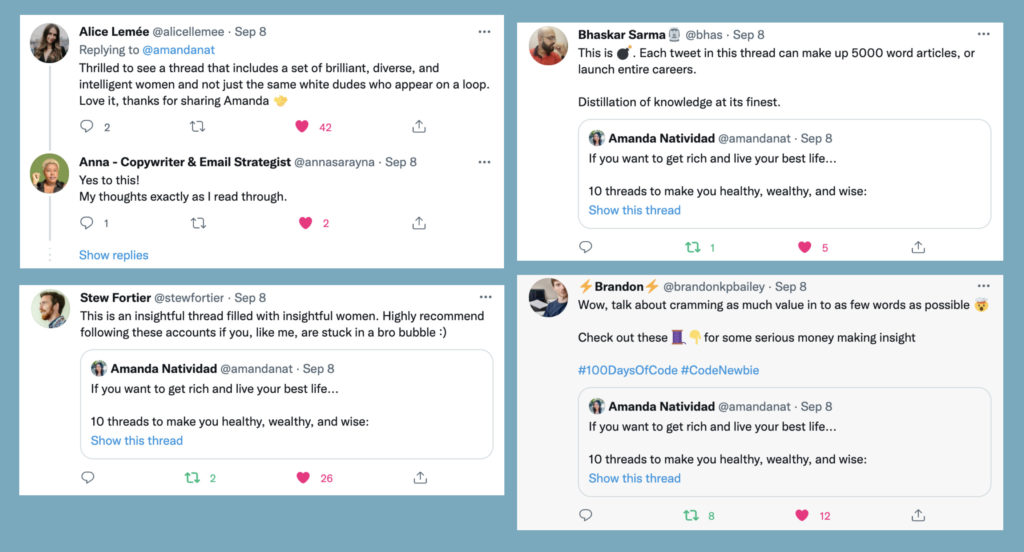Last week I had my best-performing Twitter thread. 2k+ retweets. 10k+ likes. 900k impressions.
I kicked it off with the hook: “10 threads to make you healthy, wealthy and wise.” And for good measure, I also threw in a line about getting rich. I was optimizing for virality.
The buried treasure in the thread: I only highlighted women creators.
Why did I hide my mission of inclusiveness in plain sight? Because calling it out directly wouldn’t have been effective.
When we see actions we don’t like, we call attention to it. Scold the bad actor to do better. We’re hardwired to do this. People who violate the tribe’s rules are casted out, and the remaining tribe members thrive together.
But shaming is rarely effective, especially in the long term. It can devolve into personal attacks, detracting from the greater good. Mostly, shaming is off-putting.
Same way we never listened when our parents nagged us to clean our rooms, shaming people doesn’t inspire them to join your side.
The way I see it, there are three ideal elements to inspire change:
Celebrate. Example: “Yay! Free vaccines for all!”
Normalize. Example: “You have to check out this amazing advice. Oh yeah, it happens to come from women of various skills and ethnic backgrounds.”
…and both should be wrapped in novelty for the surprise and delight factor.
When we tap into the spirit of celebration, we reward the preferred behavior and shine a light on the outcome. Let’s look to Israel and their Covid vaccine rollout as an example. One bar doubled as a clinic, offering free non-alcoholic drinks to those who got their vaccine shot. (Medicine at a bar? How novel!) In February 2021, over 43% of their population had at least their first Pfizer dose.
In the U.S. only one known franchise took on the spirit of celebration: Krispy Kreme. They began offering a free doughnut per day to customers with proof of vaccination. But they drew swift criticism for their unhealthy food items and contributions to obesity. Shame of sugary food choices (uh… as well as politics, widespread misinformation, and confusing CDC guidance) eclipsed celebration. In September 2021, as I type this, only 54% of the U.S. population is fully vaccinated.
When we normalize the preferred behavior, we fold it into our everyday thinking. We nudge it to become the status quo, de-risking it for those who are reluctant to change their minds. One way to do this is through a simple reframing. In 2019, Second Harvest of Silicon Valley sought to improve attendance at their food pantry pickup — so they rebranded it as a free farmers market.
And it worked. More families showed up because the stigma was reduced. Rather than feeling like they were getting a handout, the farmers market felt like a new and novel family event.
Celebrating and normalizing don’t have to be mutually exclusive. In fact, I suspect they’re most effective when they play off each other.
Let’s further deconstruct my thread:
- Intro: Punchy hook that taps into your emotions. Hell yeah, I want to be rich and smart.
- Body: Links to already-viral threads from women across industries. Virality indicated social proof. Of course, I should listen to them. Clearly, a lot of people think they’re smart.
- Conclusion: Typical call-to-action to retweet and follow me. Well, this thread definitely delivered. I’m totally going to share this.
The topic of the thread was normal: self-improvement across various aspects of life. The celebration? It was in your mind as you felt the dopamine hit of novel, valuable information. It was in your heart if you felt seen as a member of a marginalized group. Cue the likes and retweets.

Any kind of behavioral change involves some level of risk, even if that risk exists only in someone’s mind. Do I really revise my thinking? Should I do this? Is it safe? Our lizard brain races. But in leading by example, we’re showing others it’s safe. And in amplifying the positive outcomes, we’re reinforcing it.
So, be that change you want to see. And celebrate when you make an impact.
Featured photo by S O C I A L . C U T on Unsplash




